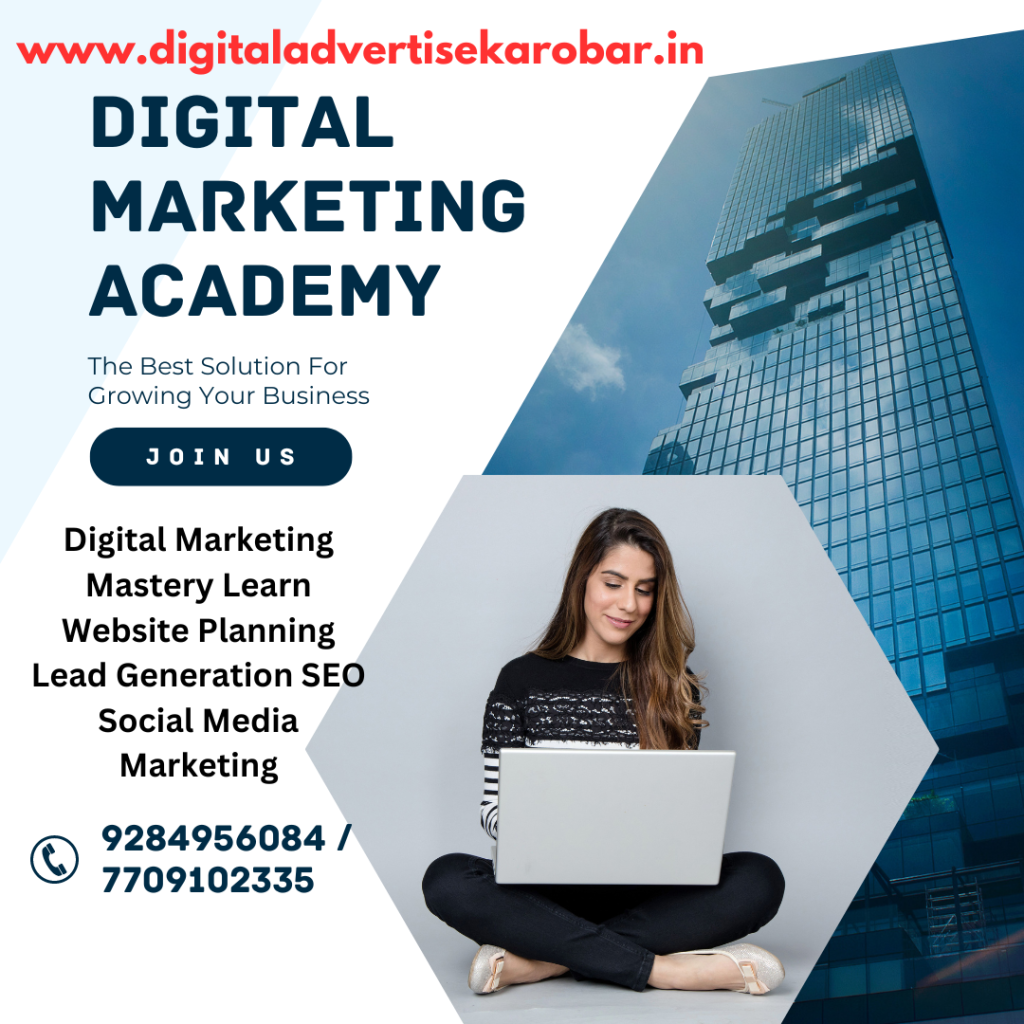Digital Marketing Mastery Learn Website Planning Lead Generation SEO Social Media Marketing

Digital Marketing Mastery Learn Website Planning Lead Generation SEO Social Media Marketing
Digital Marketing Mastery Learn Website Planning Lead Generation SEO Social Media Marketing
Introduction:
Digital marketing has become an essential tool for businesses to reach their target audience and increase their online presence. A well-planned and executed digital marketing strategy can help businesses generate leads, drive traffic to their website, and improve brand visibility. In this article, we will discuss how to master digital marketing by learning website planning, lead generation, SEO, and social media marketing. We will cover recent topics and current digital keywords to help you stay up-to-date with the latest trends and best practices.
Website Planning:
Website planning is an essential part of digital marketing, as it lays the foundation for a successful online presence. A well-designed website should be easy to navigate, visually appealing, and optimized for search engines. The following are the key elements of website planning:
Define your goals: Before you start building your website, you need to define your goals. What do you want your website to achieve? Do you want to generate leads, sell products, or build brand awareness? Defining your goals will help you create a website that meets your business needs.
Identify your target audience: You need to identify your target audience to create a website that resonates with them. What are their demographics, interests, and online behavior? Understanding your target audience will help you create a website that is user-friendly and engaging.
Choose the right platform: There are many website platforms available, such as WordPress, Wix, and Shopify. You need to choose the right platform that suits your business needs and budget.
Optimize for search engines: Your website needs to be optimized for search engines to rank higher in search results. This includes optimizing your website’s content, meta tags, and images.
Lead Generation:
Lead generation is the process of attracting and converting potential customers into leads. The following are the key elements of lead generation:
Create valuable content: You need to create valuable content that educates and informs your target audience. This could be in the form of blog posts, ebooks, or webinars.
Use lead magnets: Lead magnets are free resources that you offer in exchange for a user’s email address. This could be a free ebook, white paper, or template.
Optimize your website’s forms: Your website’s forms need to be optimized to capture leads effectively. This includes using clear and concise language, reducing form fields, and using attention-grabbing headlines.
Use email marketing: Email marketing is a powerful tool for lead generation. You can use email marketing to nurture leads, promote your products or services, and drive traffic to your website.
SEO:
Search engine optimization (SEO) is the process of optimizing your website to rank higher in search results. The following are the key elements of SEO:
Keyword research: You need to conduct keyword research to identify the keywords that your target audience is searching for. This will help you optimize your website’s content and meta tags.
On-page optimization: On-page optimization involves optimizing your website’s content, meta tags, and images. This includes using keywords in your content, optimizing your meta tags, and compressing your images.
Off-page optimization: Off-page optimization involves building backlinks to your website from other authoritative websites. This will help improve your website’s authority and rank higher in search results.
Local SEO: Local SEO is a type of SEO that focuses on optimizing your website for local searches. This includes optimizing your website’s content for local keywords, creating a Google My Business profile, and building local backlinks.
Social Media Marketing:
Social media marketing is the process of using social media platforms to promote your products or services.
Digital Marketing Mastery Learn Website Planning Lead Generation SEO Social Media Marketing
The following are the key elements of social media marketing:
- Choose the right social media platforms: You need to choose the right social media platforms that your target audience uses
Create a social media strategy: You need to create a social media strategy that aligns with your business goals. This includes defining your target audience, choosing the right social media platforms, creating engaging content, and measuring your results.
Create engaging content: You need to create engaging content that resonates with your target audience. This could be in the form of images, videos, or blog posts.
Use social media advertising: Social media advertising is a powerful tool for promoting your products or services. You can use social media advertising to target your audience based on demographics, interests, and online behavior.
Engage with your audience: You need to engage with your audience by responding to their comments, messages, and mentions. This will help you build a loyal following and improve brand awareness.
Recent Topics and Current Digital Keywords:
The digital marketing landscape is constantly evolving, and it’s important to stay up-to-date with the latest trends and best practices. The following are some recent topics and current digital keywords that you should be aware of:
Voice search optimization: With the rise of voice assistants like Alexa and Google Home, optimizing your website for voice search is becoming increasingly important. This includes using long-tail keywords and creating conversational content.
Video marketing: Video marketing is becoming more popular, and it’s a great way to engage with your target audience. This includes creating short, engaging videos for social media, YouTube, and your website.
Influencer marketing: Influencer marketing is a type of social media marketing that involves partnering with influencers to promote your products or services. This includes identifying the right influencers for your brand, creating engaging content, and measuring your results.
User-generated content: User-generated content is a type of content that is created by your customers or followers. This includes reviews, testimonials, and social media posts. User-generated content is a powerful tool for improving brand awareness and building trust with your audience.
Conclusion:
Digital marketing is a powerful tool for businesses to reach their target audience and increase their online presence. By mastering website planning, lead generation, SEO, and social media marketing, you can create a successful digital marketing strategy that drives traffic to your website, generates leads, and improves brand visibility. It’s important to stay up-to-date with the latest trends and best practices, including voice search optimization, video marketing, influencer marketing, and user-generated content. With the right strategy, you can achieve digital marketing mastery and take your business to the next level.
Digital Marketing Mastery Learn Website Planning Lead Generation SEO Social Media Marketing
Artificial intelligence (AI) is becoming increasingly important in the digital marketing landscape. AI tools can help businesses improve their marketing strategies, automate repetitive tasks, and personalize their messaging to their target audience. Here are some recent AI tools and how to use them for digital marketing:
Chatbots: Chatbots are AI-powered tools that can be used to interact with customers in real-time. They can be used to answer frequently asked questions, provide product recommendations, and even complete transactions. Chatbots can help businesses save time and money, while also improving customer satisfaction.
Personalization tools: Personalization tools use AI to analyze customer data and personalize messaging to each individual customer. This can include personalized emails, targeted ads, and product recommendations. Personalization can help businesses improve customer engagement and drive sales.
Voice search optimization tools: Voice search optimization tools use AI to analyze search patterns and optimize websites for voice search. This can include using long-tail keywords and creating conversational content. Voice search optimization can help businesses improve their search engine rankings and reach a larger audience.
Predictive analytics tools: Predictive analytics tools use AI to analyze customer data and predict future behavior. This can include predicting which customers are most likely to make a purchase or which products will be most popular. Predictive analytics can help businesses make data-driven decisions and improve their marketing strategies.
Content creation tools: Content creation tools use AI to analyze customer data and create personalized content for each individual customer. This can include personalized product descriptions, blog posts, and social media content. Content creation tools can help businesses improve customer engagement and drive sales.
In conclusion, AI is becoming increasingly important in the digital marketing landscape. Businesses can use AI tools like chatbots, personalization tools, voice search optimization tools, predictive analytics tools, and content creation tools to improve their marketing strategies, automate repetitive tasks, and personalize their messaging to their target audience. By using AI tools, businesses can improve their customer engagement, drive sales, and stay ahead of the competition.
Digital Marketing Mastery Learn Website Planning Lead Generation SEO Social Media Marketing
Digital marketing is a vast and constantly evolving field that encompasses a range of strategies and techniques. In this response, I will delve deeper into the specific areas of website planning, lead generation, SEO, and social media marketing, and provide some additional insights and tips to help you master these aspects of digital marketing.
Website Planning: Effective website planning is a crucial component of any digital marketing strategy. A well-designed website can help establish credibility and trust, drive traffic, and generate leads. When planning your website, it’s important to consider your target audience, the purpose of your website, and the user experience you want to create. This involves everything from the layout and design to the content and navigation. Some key elements to consider include clear calls-to-action, easy navigation, responsive design, and a focus on mobile optimization.
Lead Generation: Lead generation is the process of attracting and capturing the interest of potential customers for the purpose of converting them into paying customers. The goal is to create a steady flow of high-quality leads that can be nurtured and converted into customers over time. To generate leads, you need to offer something of value to your target audience, such as a free ebook, a webinar, or a consultation. You can then use various digital marketing channels to promote your offer, including social media, email marketing, and paid advertising. It’s important to track and measure the effectiveness of your lead generation efforts to ensure you’re reaching the right audience and generating a positive return on investment.
SEO: Search engine optimization (SEO) is the process of optimizing your website to rank higher in search engine results pages (SERPs). This involves a range of techniques, including keyword research, on-page optimization, link building, and content creation. Some key factors that can impact your SEO include website speed, mobile-friendliness, content quality and relevance, and backlink profile. To improve your SEO, focus on creating high-quality content that provides value to your audience, and make sure your website is optimized for the search engines.
Social Media Marketing: Social media is a powerful tool for building brand awareness, engaging with your audience, and driving traffic to your website. To be effective, your social media strategy should be aligned with your overall business goals, and focus on the platforms that your target audience is most active on. Some key tactics to consider include creating and sharing high-quality content, engaging with your audience through comments and direct messages, running paid ads, and leveraging social media influencers. It’s also important to track and measure the effectiveness of your social media marketing efforts to ensure you’re achieving your desired outcomes.
In conclusion, mastering website planning, lead generation, SEO, and social media marketing requires a combination of knowledge, skills, and practice. By focusing on the key elements outlined above, and staying up-to-date with the latest trends and best practices, you can develop a strong digital marketing strategy that helps you achieve your business goals.
